
Altria Group, Inc. is an American corporation and one of the world's largest producers and marketers of tobacco, cigarettes, and related products. It operates worldwide and is headquartered in Henrico County, Virginia, just outside the city of Richmond.

The R. J. Reynolds Tobacco Company (RJR) is an American tobacco manufacturing company based in Winston-Salem, North Carolina, and headquartered at the RJR Plaza Building. Founded by R. J. Reynolds in 1875, it is the second-largest tobacco company in the United States. The company is a wholly owned subsidiary of Reynolds American, after merging with the U.S. operations of British American Tobacco in 2004.

Nabisco is an American manufacturer of cookies and snacks headquartered in East Hanover, New Jersey. The company is a subsidiary of Illinois-based Mondelēz International.
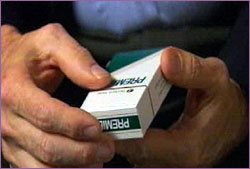
Premier was an American brand of smokeless cigarettes which was owned and manufactured by the R.J. Reynolds Tobacco Company (RJR). Premier was released in the United States in 1988. It was the first commercial heated tobacco product. However, it was difficult to use and tasted unpleasant; as a result, it was unpopular with consumers. A commercial failure, the brand was a significant financial loss for RJR and was quickly taken off the market.
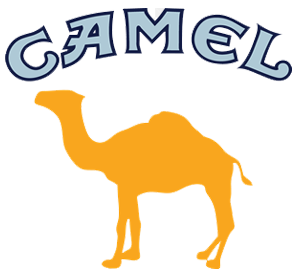
Camel is an American brand of cigarettes, currently owned and manufactured by the R. J. Reynolds Tobacco Company in the United States and by Japan Tobacco outside the U.S.
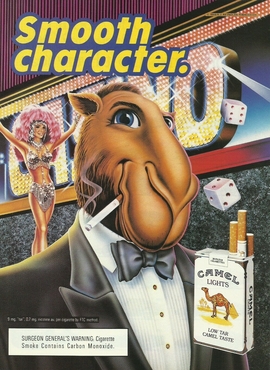
Joe Camel was an advertising mascot used by the R. J. Reynolds Tobacco Company (RJR) for their cigarette brand Camel. The character was created in 1974 for a French advertising campaign, and was redesigned for the American market in 1988. He appeared in magazine advertisements, clothing, and billboards among other print media and merchandise.

R. J. Reynolds Nabisco, Inc., doing business as RJR Nabisco, was an American conglomerate, selling tobacco and food products, headquartered in the Calyon Building in Midtown Manhattan, New York City. R. J. Reynolds Nabisco stopped operating as a single entity in 1999. Both RJR and Nabisco still exist.

KKR & Co. Inc., also known as Kohlberg Kravis Roberts & Co., is an American global investment company that manages multiple alternative asset classes, including private equity, energy, infrastructure, real estate, credit, and, through its strategic partners, hedge funds. As of December 31, 2023, the firm had completed more than 730 private equity investments in portfolio companies with approximately $710 billion of total enterprise value. As of December 31, 2023, assets under management (AUM) and fee paying assets under management (FPAUM) were $553 billion and $446 billion, respectively.

Hawaiian Punch is an American brand of fruit punch currently manufactured by Keurig Dr Pepper, originally invented in 1934 by A.W. Leo, Tom Yeats, and Ralph Harrison as a topping for ice cream. It was started from an original syrup flavor called Leo's Hawaiian Punch, containing orange, pineapple, passion fruit, guava and papaya, and is currently offering 14 different flavors since 2020. Though earlier versions contained 10% fruit juice, the drink is currently made with 3% fruit juice.
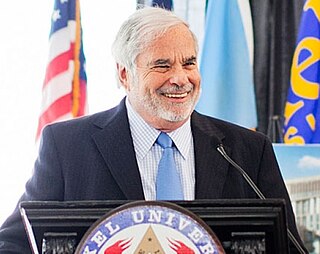
Bennett S. LeBow is an American businessman and philanthropist. He is the founder and chairman of the board of Vector Group. After LeBow acquired the cigarette manufacturer Liggett Group in 1986, the company became involved in anti-tobacco lawsuits culminating in the 1998 Tobacco Master Settlement Agreement.
Viceroy is an American brand of cigarettes, currently owned and manufactured by R. J. Reynolds Tobacco Company in the United States and British American Tobacco outside of the United States.

Reynolds American, Inc. is an American tobacco company which is a subsidiary of British American Tobacco and is the second-largest tobacco company in the United States. Its holdings include R. J. Reynolds Tobacco Company, American Snuff Company, Santa Fe Natural Tobacco Company, and Niconovum AB.
Doral is an American brand of cigarettes, currently owned and manufactured by the R.J. Reynolds Tobacco Company.

RJR-MacDonald Inc v Canada (AG), [1995] 3 S.C.R. 199 is a leading Canadian constitutional decision of the Supreme Court of Canada what upheld the federal Tobacco Products Control Act but struck out the provisions that prevented tobacco advertising and unattributed health warnings.
The RJR Championship was a golf tournament on the Champions Tour from 1987 to 2002. It was played in Clemmons, North Carolina at Tanglewood Park.

Prince Albert is an American brand of hand-rolled-cigarette and pipe tobacco, introduced by the R.J. Reynolds Tobacco Company in 1907. It has been owned since 1987 by John Middleton Inc.
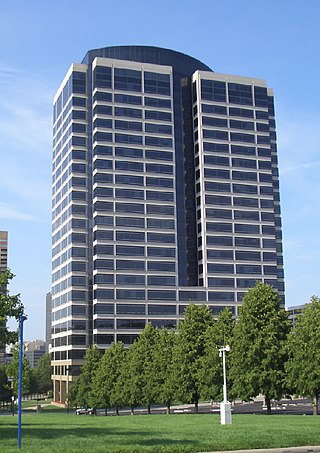
Shook, Hardy & Bacon (SHB), L.L.P. is a U.S. law firm based in Kansas City, Missouri. In 2012, The National Law Journal ranked the firm as the 87th largest in the United States. The firm has offices in Los Angeles, Atlanta, and Boston.
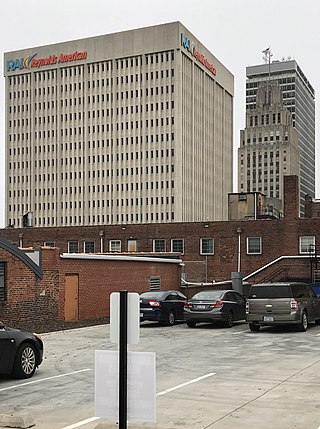
The RJR Plaza Building is a 16-story skyscraper in Winston-Salem, North Carolina which was completed in 1982 for R. J. Reynolds Tobacco Company, currently the second-largest tobacco manufacturer in the United States. In 2009, the RJR Plaza building became the headquarters for both Reynolds Tobacco and its parent company Reynolds American after Reynolds decided in 2008 to vacate its longtime headquarters, the Reynolds Building.
Peter A. Cohen is the chairman and CEO of Andover National Corporation, a public holding company. He was formerly the chairman and CEO of Cowen Inc., also known as Cowen & Company now TD Cowen. Prior to his current role, Cohen founded Ramius Capital Management in 1994, a $13 billion investment firm, which he merged with Cowen Inc. in 2009. Prior to this, Cohen was the chairman and chief executive officer of Shearson Lehman American Express from 1983 through 1991.
Compelled speech is a transmission of expression required by law. A related legal concept is protected speech. Just as freedom of speech protects free expression, in many cases it similarly protects an individual from being required to utter or otherwise express a thought with which that individual disagrees.













